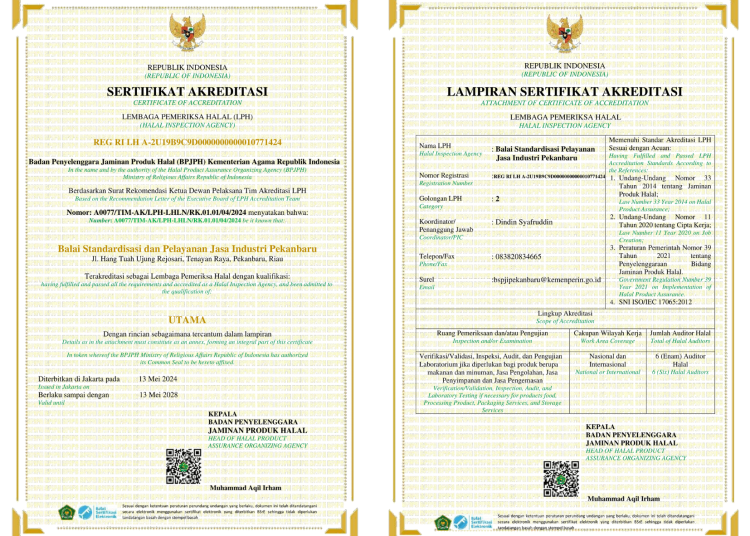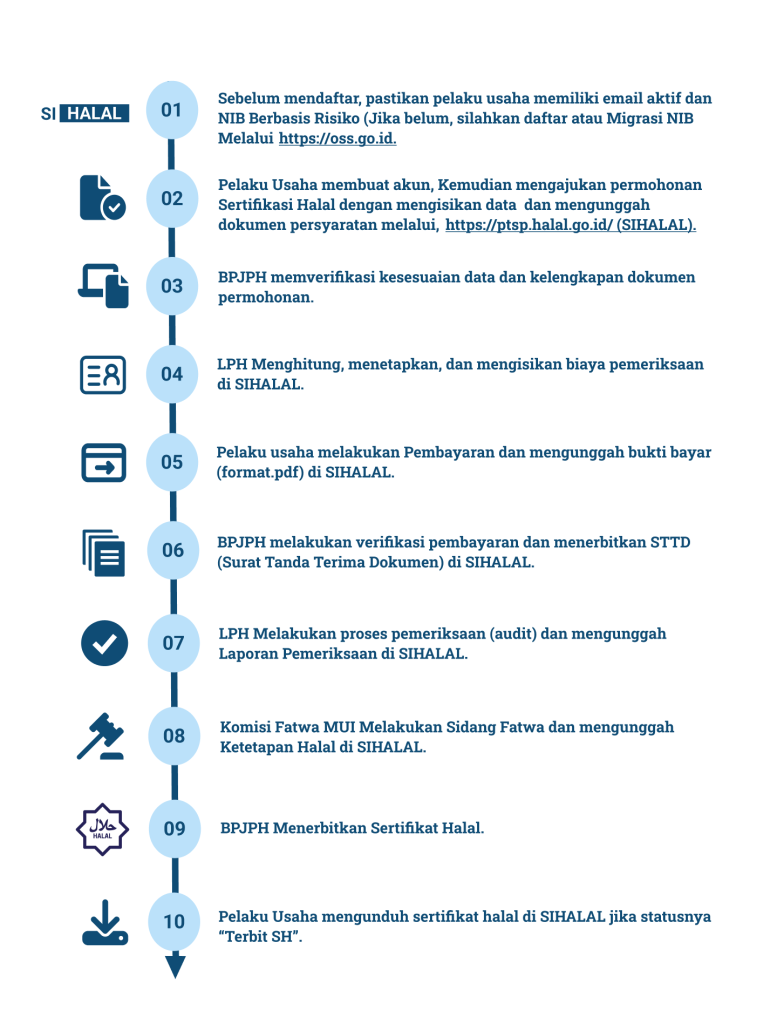Halal Inspection Agency
Halal Inspection Agency is an institution that carries out inspection and/or testing activities related to product halalness. BSPJI Pekanbaru Halal Inspection Agency has been accredited as a Primary Halal Inspection Body with a scope of work that covers both national and international levels.
Our Accreditation Certificate of the Primary Halal Inspection Agency:

Scope of Services
The following are the scopes of the BSPJI Pekanbaru Halal Inspection Agency:
| No | Category | Scope |
|---|---|---|
| 1 | Goods | Food |
| 2 | Goods | Beverages |
| 3 | Services | Processing |
| 4 | Services | Storage |
| 5 | Services | Packaging |
Halal Certification Process Flow

Halal Certification Required Documents
| List of Halal Certification Documents |
|---|
| 1. Halal Application Letter |
| 2. Business Identification Number |
| 3. Decree on the Appointment of Halal Supervisor |
| 4. List of Ingredients and Products |
| 5. Production Process Flowchart |
| 6. Halal Assurance System Manual |
Certification Scheme
| Skema Sertifikasi Halal |
|---|
| 1. Skema Halal Jasa Pengolahan |
| 2. Skema Halal Jasa Penyimpanan |
| 3. Skema Halal Jasa Pengemasan |
| 4. Skema Halal Makanan |
| 5. Skema Halal Minuman |
Fee for Certification
Here is the estimated fee for BSPJI Pekanbaru Halal Inspection Agency Product Halal Certification in accordance with Kepkaban 22-2024 – Perubahan IV Kepkaban 141 Tahun 2021.:
| 1 | Application & Registration | Per Certificate | IDR 300,000 | IDR 5,000,000 | IDR 12,500,000 | IDR 13,300,000 | Kepkaban BJPH No.22/2024 | |||
| 2 | Operational Costs | Per Certificate | IDR 480,000 | IDR 960,000 | IDR 1,440,000 | IDR 1,920,000 | Operational costs of the Halal Inspection Agency are calculated once. | |||
| 3 | Auditor Fees | Mandays | Within the City: 150,000 Outside the City (within the Province): IDR 370,000 Outside the Province: IDR 360,000 – 580,000 Overseas: according to the Standard Cost Guidelines of Ministry of Finance | – Transportation and accommodation are provided by the Business Entity or according to the Standard Cost Guidelines of Ministry of Finance . – Auditor fees is calculated based on the number of mandays (Audtior Fees × mandays). |
||||||
| 4 | Total Unit Cost Based on Product Type: | Mandays Based on the Number of Products Inspected: | Unit cost is calculated based on the number of mandays (unit cost × mandays). | |||||||
| a. Food and Beverages | 0 – 50 = 2 51 – 100 = 3 101 – 200 = 4 > 200 = 5 | IDR 350,000 | IDR 6,468,750 | IDR 6,468,750 | IDR 6,468,750 | |||||
| b. Gelatin Products | 0 – 50 = 2 51 – 100 = 3 101 – 200 = 4 > 200 = 5 | IDR 350,000 | IDR 7,912,000 | IDR 7,912,000 | IDR 7,912,000 | |||||
| c. Food and Beverage Services with Processing | 0 – 20 = 4 21 – 40 = 5 41 – 60 = 6 > 60 = 7 | IDR 350,000 | IDR 6,468,750 | IDR 6,468,750 | IDR 3,687,500 | |||||
| d. Processing, Storage, and Packaging Services | 0 – 50 = 2 51 – 100 = 3 101 – 200 = 4 > 200 = 5 | IDR 350,000 | IDR 6,468,750 | IDR 6,468,750 | IDR 5,275,000 | |||||
| 5 | Testing: | Testing is conducted if required by the auditor. | ||||||||
| a. Real-time PCR for Porcine DNA | Per Product Sample | IDR 1,500,000 | IDR 1,500,000 | IDR 1,500,000 | IDR 1,500,000 | |||||
| b. Alcohol (Gas Chromatography Method) | Per Product Sample | IDR 182,000 | IDR 182,000 | IDR 182,000 | IDR 182,000 | |||||
Laboratory Facilities
The following are the laboratory facilities available at the BSPJI Pekanbaru Halal Inspection Agency:
| No. | Equipment / Instrument | Function / Capability |
|---|---|---|
| 1 | Freezer | Sample storage |
| 2 | Analytical Balance | Sample weighing |
| 3 | Micropipette | Pipetting solutions |
| 4 | Cell Disrupter | Sample disruption |
| 5 | Vortex Mixer | Homogenizing solutions |
| 6 | Spin Down | Sedimenting solution to the bottom of the tube |
| 7 | Thermoshaker | DNA lysis |
| 8 | Microcentrifuge | Precipitating inhibitors |
| 9 | Nanophotometer | DNA quantification |
| 10 | PCR Workstation | Area for reagent reaction preparation |
| 11 | Real-time PCR System | DNA detection and analysis |
Client Directory
The following are the clients of the BSPJI Pekanbaru Halal Inspection Agency.
| Kota Perusahaan/Pelaku Usaha | ||||
|---|---|---|---|---|
| 1 | PT. SARANA JASA KELOLA | Penyediaan makanan dan minuman dengan pengolahan | Kab. Bengkalis | ID14210002033261022 |
| 2 | ALVA MARDIANSYAH | Pangan siap saji | Kota Pekanbaru | ID14110001779711122 |
| 3 | HARJONO | Serealia dan produk serealia yang merupakan produk turunan dari biji serealia, akar dan umbi, kacang-kacangan dan empulur dengan pengolahan dan penambahan bahan tambahan pangan | Kab. Indragiri Hilir | ID14110001889701122 |
| 4 | JEFRIDIN | Ikan dan produk perikanan, termasuk moluska, krustase, dan ekinodermata dengan pengolahan dan penambahan bahan tambahan pangan | KAB. BENGKALIS | ID14110001779761222 |
| 5 | SYAMSUL | Produk bakeri | KAB. BENGKALIS | ID14110001779781222 |
| 6 | PT. SURYA MURNI SARI | Minuman dengan pengolahan | KOTA PEKANBARU | ID14210015619980123 |
| 7 | CV. GREENSMOOTHIE FACTORY | Penyediaan makanan dan minuman dengan pengolahan | KOTA PEKANBARU | ID14210010677210223 |
| 8 | CV. ALAMSYAH FROZEN FOOD | Pangan siap saji | KAB. INDRAGIRI HULU | ID14110010680270223 |
| 9 | OKTARINA NINGSIH | Gula dan pemanis termasuk madu | KOTA PEKANBARU | ID14110010676830823 |
| 10 | ISHABEL BIELQIS KHANDISYA | Ikan dan produk perikanan, termasuk moluska, krustase, dan ekinodermata dengan pengolahan dan penambahan bahan tambahan pangan | KOTA PEKANBARU | ID14110010675010923 |
| 11 | NORMALA | Buah dan sayur dengan pengolahan dan penambahan bahan tambahan pangan | KAB. BENGKALIS | ID14110010677030923 |
| 12 | ASEP PURNAMA | Produk bakeri | KAB. BENGKALIS | ID14110010677070923 |
| 13 | EMI ZULIKA | Produk bakeri | KAB. BENGKALIS | ID14110010677130923 |
| 14 | GINEM | Makanan ringan siap santap | KAB. BENGKALIS | ID14110010669680923 |
| 15 | ERNAWATI | Makanan ringan siap santap | KAB. BENGKALIS | ID14110010677230923 |
| 16 | ENI SYAIFATUL AFIDAH | Makanan ringan siap santap | KAB. BENGKALIS | ID14110010677320923 |
| 17 | TUTI SARINUM | Makanan ringan siap santap | KAB. BENGKALIS | ID14110010677440923 |
| 18 | PT. PUTIBUANA MAJU JAYA | Daging dan produk olahan daging | KOTA PEKANBARU | ID14210015621091023 |
| 19 | JEFRY | Minuman dengan pengolahan | KOTA PEKANBARU | ID14110015624551023 |
| 20 | NOFERY | Penyediaan makanan dan minuman dengan pengolahan | KOTA PEKANBARU | ID14110015747091023 |
| 21 | ANDI SYAHPUTRA | Minuman dengan pengolahan | KAB. BENGKALIS | ID14110015624711023 |
| 22 | ADANI FATAHILAL ARIFIN | Penyediaan makanan dan minuman dengan pengolahan | KOTA PEKANBARU | ID14110019597051023 |
| 23 | ALDI JULIANTO | Penyediaan makanan dan minuman dengan pengolahan | KOTA PEKANBARU | ID14110019597041023 |
| 24 | PATAN IFWA HALLA | Penyediaan makanan dan minuman dengan pengolahan | KOTA PEKANBARU | ID14110020229131023 |
| 25 | PUTRI JUNITA SANTALIA | Penyediaan makanan dan minuman dengan pengolahan | KOTA PEKANBARU | ID14110020229121023 |
| 26 | PANCA SETIAWATI | Produk bakeri | KAB. BENGKALIS | ID14110015624951023 |
| 27 | AFDANI | Garam, rempah, sup, saus, salad, serta produk protein | KAB. BENGKALIS | ID14110015621191023 |
| 28 | Noni Febriani | Penyediaan makanan dan minuman dengan pengolahan | KOTA PEKANBARU | ID14110019597031123 |
| 29 | BUMDESA BERKAH BERSAMA SERESAM | Minuman dengan pengolahan | KAB. INDRAGIRI HULU | ID14110015619741123 |
| 30 | IJAM BR. SIAHAAN | Makanan ringan siap santap | KAB. BENGKALIS | ID14110015624921123 |
| 31 | RASMI | Makanan ringan siap santap | KAB. BENGKALIS | ID14110015624891123 |
| 32 | RAMINDAH | Makanan ringan siap santap | KAB. BENGKALIS | ID14110018209241123 |
| 33 | HELDAYANI | Produk bakeri | KAB. BENGKALIS | ID14110018209281123 |
| 34 | JURITA | Makanan ringan siap santap | KAB. BENGKALIS | ID14110018209321123 |
| 35 | MHD RASYIDI | Buah dan sayur dengan pengolahan dan penambahan bahan tambahan pangan | KAB. BENGKALIS | ID14110015624861223 |
| 36 | SUMIATUN | Makanan ringan siap santap | KAB. BENGKALIS | ID14110015624811223 |
| 37 | ARDIAN SUPARMIN | Gula dan pemanis termasuk madu | KAB. SIAK | ID14110010676350523 |
| 38 | NOVRA VILOGA | Produk bakeri | KOTA PEKANBARU | ID14110010956940523 |
| 39 | PT. KALGARYS NUSA INDONESIA | Penyediaan makanan dan minuman dengan pengolahan | KOTA PEKANBARU | ID14210010675800623 |
| 40 | CV. BIO INVESTAMA SELATAN | Minuman dengan pengolahan | KAB. INDRAGIRI HILIR | ID14110010673950723 |
| 41 | SUMIATI | Daging dan produk olahan daging | KOTA PEKANBARU | ID14110010676620723 |
| 42 | SEPTINA SARI | Ikan dan produk perikanan, termasuk moluska, krustase, dan ekinodermata dengan pengolahan dan penambahan bahan tambahan pangan | KAB. BENGKALIS | ID14110018209350124 |
| 43 | EEN PARMATA SARI | Produk bakeri | KAB. BENGKALIS | ID14110019597020124 |
| 44 | YOSSI FEBRIANA PUTRI | Penyediaan makanan dan minuman dengan pengolahan | KAB. BENGKALIS | ID14110018209360124 |
| 45 | DANI ELFIA | Produk bakeri | KAB. BENGKALIS | ID14110018209370124 |
| 46 | NURUL HIDAYATI | Produk bakeri | KAB. BENGKALIS | ID14110019597010124 |
| 47 | INDAH TRI WAHYUNI | Penyediaan makanan dan minuman dengan pengolahan | KOTA PEKANBARU | ID14110018209390124 |
| 48 | Family Jaya | Produk bakeri | KAB. BENGKALIS | ID14110018209400224 |
| 49 | PT MITRA KAMPAR PETKO | Penyediaan makanan dan minuman dengan pengolahan | KAB. KAMPAR | ID14110018209180224 |
| 50 | PT. PELITA PANGAN ANDALAN | Lemak, minyak, dan emulsi minyak | KOTA DUMAI | ID14210018209170324 |
| 51 | ASMAWATI | Daging dan produk olahan daging | KOTA PEKANBARU | ID14110019597000424 |
| 52 | SUHANDI | Produk bakeri | KOTA PEKANBARU | ID14110019596990524 |
| 53 | PT. MURINIWOOD INDAH INDUSTRY | Lemak, minyak, dan emulsi minyak | KAB. BENGKALIS | ID00410019596360724 |
| 54 | PT. PANCASURYA AGRINDO | Lemak, minyak, dan emulsi minyak | KAB. ROKAN HULU | ID00410019596330724 |
| 55 | PT. PERDANA INTISAWIT PERKASA | Lemak, minyak, dan emulsi minyak | KAB. ROKAN HULU | ID00410019595330724 |
| 56 | PT. SETIA AGRINDO MANDIRI | Lemak, minyak, dan emulsi minyak | KAB. INDRAGIRI HILIR | ID00410019596390724 |
| 57 | PT. MERIDAN SEJATISURYA PLANTATION | Lemak, minyak, dan emulsi minyak | KAB. SIAK | ID00410019596340724 |
| 58 | PT. SUBUR ARUMMAKMUR | Lemak, minyak, dan emulsi minyak | KAB. KAMPAR | ID00410019596300724 |
| 59 | PT. SURYA INTISARI RAYA | Lemak, minyak, dan emulsi minyak | KOTA PEKANBARU | ID00410019596370724 |
| 60 | PT. SURYA DUMAI AGRINDO | Lemak, minyak, dan emulsi minyak | KAB. BENGKALIS | ID00410019596380724 |
| 61 | PT. ARINDO TRISEJAHTERA | Lemak, minyak, dan emulsi minyak | KAB. KAMPAR | ID00410019595310724 |
| 62 | PT. KARYA TAMA BAKTI MULIA | Lemak, minyak, dan emulsi minyak | KAB. KUANTAN SINGINGI | ID00410019596320724 |
| 63 | PT. DEMPO TIRTA LESTARI | Minuman dengan pengolahan | KOTA PAGAR ALAM | ID16210020209610924 |

